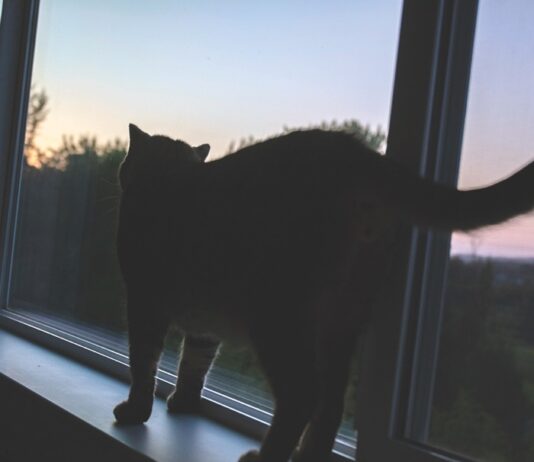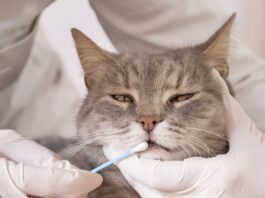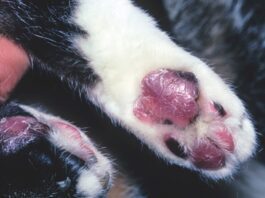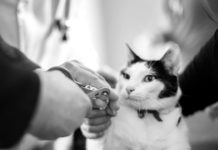Cats With Gum Disease Sought for Study
Cornell is seeking cats with chronic, non-responsive gingivostomatitis for a clinical trial using stem cells. The disease causes severe, painful inflammation affecting the gums and mucosa in the mouth. The cause remains unknown. The Dentistry and Oral Surgery Service at Cornell University Hospital for Animals will use the cats own stem cells in the research. Current treatments are less than ideal, unpredictable and associated with possible complications.
Over Half of Cats are Overweight; Overactive Thyroids in Cats
Pets were evaluated as ideal, overweight or obese. The APOPs survey also found that 54 percent of dogs were overweight or obese. The findings were nearly the same in 2014, when the association cited a fat pet gap, in which another of its surveys revealed that 90 percent of owners of overweight cats and 95 percent of owners of overweight dogs incorrectly identified their pet as normal weight. No one wants to think their pet is overweight, and overcoming denial is our first battle, said APOP founder Ernie Ward, DVM.
The Most Accurate, Non-Invasive Means to Measure Blood Pressure
There are number of ways to measure the blood pressure in the artery of a patient. The gold standard is the placement of a catheter directly into the artery and measuring the pressure within it, referred to as blood pressure, using a device called manometer. Although this technique is extremely accurate, it requires the placement of an arterial catheter (which generally requires sedation/anesthesia in veterinary patients) and specialized equipment, and is associated with risks such as bleeding and infection. For these reasons, this invasive method of measuring blood pressure is not usually employed in cats during a routine veterinary visit.
In the News: Persians DNA May Hold Clue to Their Heart Disease
Winn Feline Foundation has awarded a grant for the evaluation of DNA variants associated with hypertrophic cardiomyopathy, or HCM, in Persians. HCM is the most common cardiac disease in cats. Previously, genetic mutations have been found in Maine Coons and Ragdolls, which led to genetic tests for screening before breeding.
Claws Reveal Cats’ Health Status
Cats depend on their claws to grip while climbing. They serve as weapons in a fight, hold their prey and release scent to declare ownership of your sofa. While many cats are fastidious about grooming, indoor kitties depend on their owners to keep their claws in top shape. They dont do enough digging and scratching on abrasive objects to keep the claws short.
One Challenge in Pancreatitis: The Lack of Definitive Signs
My cat has recently been diagnosed with pancreatitis. The veterinarian explained to me that it can be difficult to diagnose, but he feels confident that this is the correct diagnosis and has started treatment. My kitty is still not eating well, and Im wondering if it is possible that something else is going on.
Acupuncture for Cats Heads Mainstream
Dusty was a black and white cat who hissed, swatted and squirmed anytime a veterinarian or technician tried to restrain her for an examination or, worse, tried to draw blood or give an injection. This same cat, however, transformed into a picture of serenity and calm during acupuncture treatments.
Treating Infectious Peritonitis; Cornell Study on Anesthesia
Feline infectious peritonitis, or FIP, a viral disease that is nearly 100 percent fatal, has been successfully treated in a research project at Kansas State University. Collaborators in diverse fields developed an antiviral compound for the feline coronavirus associated with FIP. Manuel Martin-Flores, MV, , ACVAA, of the Cornell University College of Veterinary Medicine will present preliminary results of his research on safer anesthesia for cats at the annual meeting of the American College of Veterinary Anesthesia and Analgesia in September. Dr. Martin-Flores is one of only 220 anesthesiologists board-certified worldwide by the college.
The Number 1 Reason for Lackluster Coats
Fur, primarily made of the protein keratin, grows from follicles in the skin. While human follicles each grow a single hair, animal follicles may grow many. Each follicle has an oil gland to lubricate the skin and hair, and to keep the coat lustrous. If your cats coat turns dull and dry, you may suspect a medical problem and make a veterinary appointment. Meanwhile, you might also want to check the labels on his food.
An Exciting New Frontier in Medicine
Your arthritic cat walks stiffly, and its difficult to find a medication to treat him without side effects. Could stem cell therapy be an option? Its use in human medicine has grown in the past decade, heralded as a promising treatment for a host of diseases. The latest area of pioneering research, according to the National Institutes of Health, is adult-derived stem cells for repair of the heart.
No Surprise: Canine Flu Jumps Species to Cats
At last count, at least four cats at a Northwest Indiana animal shelter have tested positive for canine influenza - one of the first times the flu strain H3N2 has jumped species in the U.S. Other cats and dogs at the Humane Society Calumet Area showed similar signs of the respiratory disease, as well as lip smacking and excessive salivation, and the shelter temporarily closed.
Fewer Heartworm Cases, More Severe Signs
Cats are less commonly infected by heartworms than dogs, and approximately 80 percent of infected cats clear the infection without signs of disease, but studies have shown the incidence of infection to be greater than previously thought. One study found that between 2 and 5 percent of shelter cats were harboring heartworms. Other statistics show that the prevalence of heartworm disease in cats likely approaches 5 percent, and that it can even occur in cats living indoors.

















